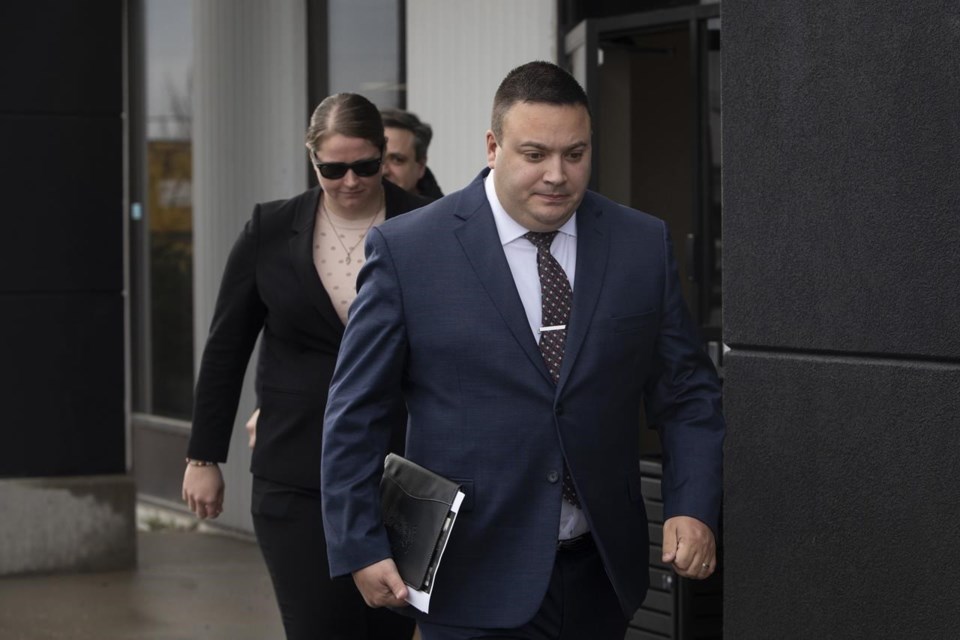EDMONTON — Lawyers for two Alberta Mounties charged with manslaughter in the shooting death of a man at a rest stop told a jury trial Thursday that their clients acted in self defence, while the Crown contends they used excessive force.
The closing arguments were made in the case of Const. Jessica Brown, 31, and Cpl. Randy Stenger, 45, who are accused of manslaughter and aggravated assault in the death of 31-year-old Clayton Crawford on July 3, 2018, near Whitecourt, Alta.
The jury has heard that Crawford suffered from 10 gunshot wounds after Brown fired her carbine rifle eight times, while Stenger shot his semi-automatic pistol four times.
Whitecourt RCMP were notified of the sighting of a purple 1992 Dodge Dakota pickup truck at a rest stop that was seen fleeing the area of a shooting the day before in Valhalla Centre, a hamlet about 300 kilometres northwest of where Crawford was killed.
Confusion as to whether or not the driver of the truck was the suspect in the shooting or the intended target came up numerous times during the trial.
Crown attorney Linda Shin told the jury that Brown and Stenger made assumptions about the information that was given to them about Crawford.
"(Brown's) guesses or assumptions were neither educated nor reasonable," said Shin. "She had all the information she needed, distorted to fit the picture she already painted."
Earlier in the trial, court heard that Brown received a vague call from the Grande Prairie RCMP where she was asked to "check out" a purple pickup truck that was spotted by an off-duty officer at a rest stop near Whitecourt. The clerk told Brown that the person in the truck may have been involved in a shooting the day before in Valhalla Centre.
Both the Crown and the defence say that the shooting in Valhalla Centre may have been about a dispute over a "drug den." Crawford was known to be involved in the drug trade and had been previously arrested for discharging a firearm. None of Crawford's criminal history was known to the two Mounties at the time.
A toxicology report showed that Crawford had methamphetamines in his blood at the time of his death.
Stenger and Brown testified last week that they fired at Crawford when he tried to flee from the Chickadee Creek rest stop after they approached him.
Prosecutors said that Brown and her team approached the truck with incomplete information about the driver and the shooting the day before.
The defence said that the Mounties had a duty to act.
"She was doing her job," said Brown's lawyer Robb Beeman. "Should they have just driven away? Of course not."
Stenger's attorney Mona Duckett said the Mounties could draw inferences from the information that they were given.
"That's not jumping to conclusions," Duckett told the jury.
Shin said before Crawford was approached, Brown and Stenger had opportunities to seek out more information about the driver of the truck and the shooting the day before.
"This case is not about what happened," Shin said to the jury. "This is a case about failure in the basics of police work."
The jury was told that when Brown and Stenger approached the truck it appeared as though the man in the driver's seat was sleeping.
Brown testified she saw Crawford reach between his legs and thought that he was reaching for a weapon. A third officer broke the driver's window with a baton and there was a struggle.
"In a desperate effort to pull him out of the car and control his hands, she had to make critical split-second decisions in real-time," said Beeman.
"Mr. Crawford was not resisting any legal arrest," Shin said. "It was Crawford who was being unlawfully assaulted."
Brown testified that Crawford started the truck and began driving backward. She said she thought he was using the truck as a weapon and she feared for her life and the lives of her colleagues.
Duckett said that her client Stenger relied on the reactions of his colleagues when he fired the first shot at Crawford.
Last week Stenger testified that Crawford was trying to run them over, and it was an automatic reaction for him to fire his gun.
"He did as he was trained," Duckett told the jury. "His response was his only option to preserve the lives that he believed were at risk."
Shin argued that the only natural reaction for Crawford was to panic after he faced the barrel of a semi-automatic weapon.
Shin repeated that it was Stenger and Brown who caused the danger at the rest stop because of the information that they did not have, nor seek when they approached the truck, armed and in broad daylight.
"We do not want the police running around, half-cocked, wielding assault weapons." Shin told the jury.
"Clayton Crawford deserved to go home to loved ones and, tragically, did not."
The jury is expected to announce its verdict in the coming days.
This report by The Canadian Press was first published Dec. 8, 2022.
___
This story was produced with the financial assistance of the Meta and Canadian Press News Fellowship.
Angela Amato, The Canadian Press


